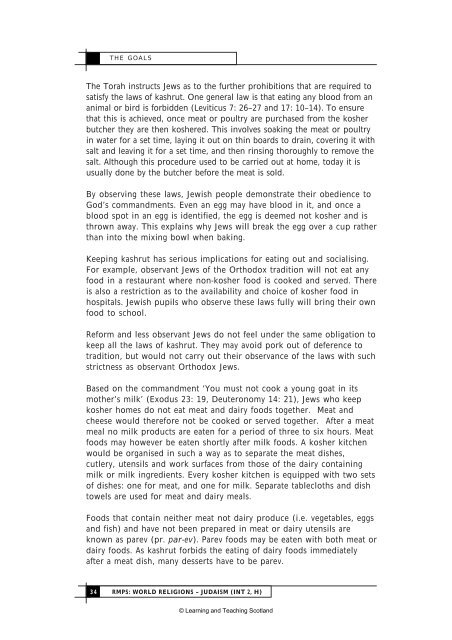RMPS - Int2/Higher - World Religions - Judaism - Education Scotland
RMPS - Int2/Higher - World Religions - Judaism - Education Scotland
RMPS - Int2/Higher - World Religions - Judaism - Education Scotland
Create successful ePaper yourself
Turn your PDF publications into a flip-book with our unique Google optimized e-Paper software.
THE GOALS<br />
The Torah instructs Jews as to the further prohibitions that are required to<br />
satisfy the laws of kashrut. One general law is that eating any blood from an<br />
animal or bird is forbidden (Leviticus 7: 26–27 and 17: 10–14). To ensure<br />
that this is achieved, once meat or poultry are purchased from the kosher<br />
butcher they are then koshered. This involves soaking the meat or poultry<br />
in water for a set time, laying it out on thin boards to drain, covering it with<br />
salt and leaving it for a set time, and then rinsing thoroughly to remove the<br />
salt. Although this procedure used to be carried out at home, today it is<br />
usually done by the butcher before the meat is sold.<br />
By observing these laws, Jewish people demonstrate their obedience to<br />
God’s commandments. Even an egg may have blood in it, and once a<br />
blood spot in an egg is identified, the egg is deemed not kosher and is<br />
thrown away. This explains why Jews will break the egg over a cup rather<br />
than into the mixing bowl when baking.<br />
Keeping kashrut has serious implications for eating out and socialising.<br />
For example, observant Jews of the Orthodox tradition will not eat any<br />
food in a restaurant where non-kosher food is cooked and served. There<br />
is also a restriction as to the availability and choice of kosher food in<br />
hospitals. Jewish pupils who observe these laws fully will bring their own<br />
food to school.<br />
Reform and less observant Jews do not feel under the same obligation to<br />
keep all the laws of kashrut. They may avoid pork out of deference to<br />
tradition, but would not carry out their observance of the laws with such<br />
strictness as observant Orthodox Jews.<br />
Based on the commandment ‘You must not cook a young goat in its<br />
mother’s milk’ (Exodus 23: 19, Deuteronomy 14: 21), Jews who keep<br />
kosher homes do not eat meat and dairy foods together. Meat and<br />
cheese would therefore not be cooked or served together. After a meat<br />
meal no milk products are eaten for a period of three to six hours. Meat<br />
foods may however be eaten shortly after milk foods. A kosher kitchen<br />
would be organised in such a way as to separate the meat dishes,<br />
cutlery, utensils and work surfaces from those of the dairy containing<br />
milk or milk ingredients. Every kosher kitchen is equipped with two sets<br />
of dishes: one for meat, and one for milk. Separate tablecloths and dish<br />
towels are used for meat and dairy meals.<br />
Foods that contain neither meat not dairy produce (i.e. vegetables, eggs<br />
and fish) and have not been prepared in meat or dairy utensils are<br />
known as parev (pr. par-ev). Parev foods may be eaten with both meat or<br />
dairy foods. As kashrut forbids the eating of dairy foods immediately<br />
after a meat dish, many desserts have to be parev.<br />
34<br />
<strong>RMPS</strong>: WORLD RELIGIONS – JUDAISM (INT 2, H)<br />
© Learning and Teaching <strong>Scotland</strong>
















